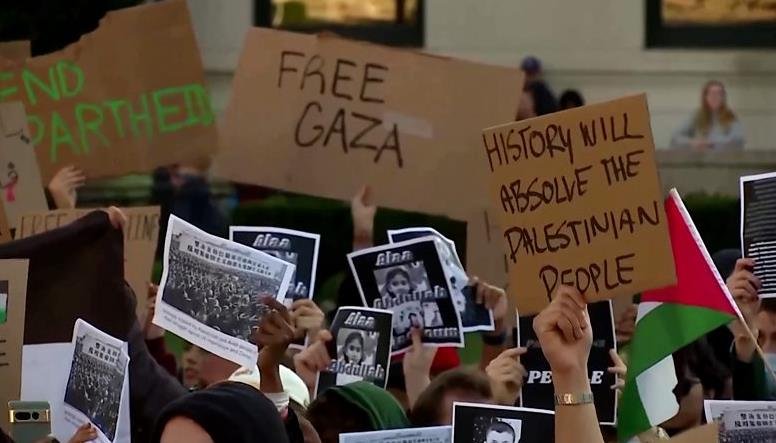A prominent US law firm has withdrawn job offers to three law students who were involved in student groups that issued statements condemning Israel’s role in the recent conflict with Hamas. The firm, Davis Polk & Wardwell, said the statements were contrary to its values and created an unsafe and exclusive work environment.
Davis Polk’s decision sparks controversy
Davis Polk & Wardwell is one of the world’s largest and most prestigious law firms, representing major financial institutions and corporations. It has offices in New York, London, Hong Kong, Tokyo, and other global cities. The firm hires top graduates from elite law schools every year.

However, this year, the firm decided to rescind job offers to three students who had accepted positions as summer associates for 2024. The students were from Harvard Law School and Columbia Law School, and they held leadership roles in student organizations that signed statements criticizing Israel for the violence that erupted in May 2023.
The statements, which were issued by the Harvard Palestine Solidarity Groups and the Columbia Palestine Solidarity Groups, blamed Israel for the escalation of the conflict and accused it of aggression, apartheid, and settler-colonization. The statements also expressed solidarity with the Palestinian people and called for an end to US military aid to Israel.
Davis Polk’s managing partner, Neil Barr, sent an email to the firm’s staff on Tuesday, explaining the rationale behind the decision. He said that the statements were “simply contrary to our firm’s values” and that rescinding the offers was “appropriate in upholding our responsibility to provide a safe and inclusive work environment for all Davis Polk employees”.
He added that the firm was still “in dialogue” with two of the students who claimed that they did not authorize or individually sign the statements. The statements did not have individual signatures, but rather listed the names of the student groups that co-signed them.
Law students and professors react to the move
The move by Davis Polk has sparked outrage and debate among law students and professors, who see it as a violation of free speech and academic freedom. They argue that the firm is punishing the students for expressing their political views on a controversial issue, and that it is creating a chilling effect on campus activism.
Some of the students who signed the statements said they were shocked and disappointed by the firm’s decision. They said they did not expect their opinions on a foreign policy matter to affect their employment prospects, and that they did not intend to offend or harm anyone.
They also said they were proud of their involvement in the student groups, which they said were diverse and inclusive spaces for dialogue and advocacy. They said they hoped that Davis Polk would reconsider its decision and respect their right to dissent.
Some of the professors who teach at Harvard Law School and Columbia Law School also expressed their support for the students. They said they were appalled by the firm’s action, which they said was discriminatory and unjustified. They said they would stand by their students and defend their academic freedom.
They also questioned the firm’s claim that the statements were contrary to its values. They pointed out that Davis Polk has represented clients who have been accused of human rights violations, corruption, fraud, and other crimes. They asked how the firm could reconcile its values with its business practices.
The wider context of the Israel-Palestine conflict
The conflict between Israel and Palestine is one of the longest-running and most complex disputes in modern history. It involves issues of land, religion, identity, security, justice, and self-determination. It has also been influenced by regional and international actors, such as Egypt, Iran, Syria, Turkey, Saudi Arabia, Russia, China, the US, and the UN.
The latest round of violence erupted in May 2023, after weeks of tensions over Israeli restrictions on Palestinian access to holy sites in Jerusalem, Israeli plans to evict Palestinian families from their homes in East Jerusalem, and Palestinian protests and clashes with Israeli police.
Hamas, the Islamist militant group that controls Gaza, launched thousands of rockets at Israel, targeting civilian areas and triggering air raid sirens and missile defenses. Israel responded with airstrikes and artillery fire at Gaza, targeting Hamas infrastructure and operatives.
The fighting lasted for 11 days and resulted in more than 250 deaths, mostly Palestinians in Gaza. More than 2,000 people were injured on both sides. The violence also sparked unrest in Israel’s mixed cities, where Jewish and Arab citizens live together. There were incidents of mob attacks, vandalism, arson, and lynching.
The conflict ended with a ceasefire brokered by Egypt on May 21. However, the underlying issues remain unresolved. Both sides claim victory but also face criticism for their actions. The international community has called for a resumption of peace talks and a two-state solution based on mutual recognition and coexistence.
